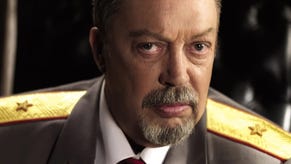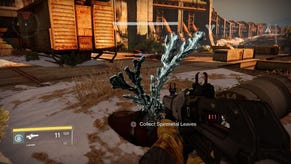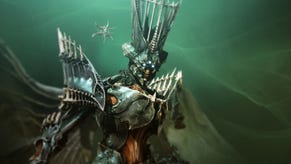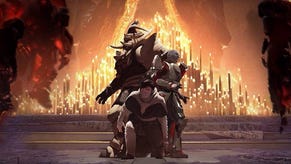The teen who spent over a year piecing together Destiny's unreleased music
Midi-multi tool.
In April 2014, veteran Bungie composer Marty O'Donnell took to Twitter to say he had been fired. Only afterwards, amid a messy lawsuit between the two parties that spilled out into the public domain, did we learn that his work on Music of the Spheres, which was intended to be a musical prequel to online shooter Destiny, had caused a rift within Bungie's board of directors. The court papers said Activision had little enthusiasm for releasing Music of the Spheres as a standalone work, and that Bungie management felt O'Donnell was elevating his interest in publishing Music of the Spheres over the best interests of the company. The upshot was that its release had been canned, and Marty, who had spent two years on the project, was furious.
To this day, Music of the Spheres remains on Bungie's cutting room floor, and it looks increasingly unlikely it'll ever see the light of day. But that didn't put a particularly determined Destiny superfan off. In fact, for this Destiny fan, piecing together Music of the Spheres and releasing a Definitive Version became a preoccupation that lasted more than a year.
Owen Spence is a 16 going on 17-year-old Destiny fan and self-taught music composer from metro-Atlanta, Georgia. When we talk over Skype he speaks clearly and matter-of-factly, as if unpacking an algorithm. Owen tells me he has higher functioning autism as well as, at times, severe Tourette's. Because of this, he hasn't gone to school in over a year, save a month at a private school that didn't work out. Right now, he's living at home with his parents. It's clear he's had a tough time of it.
"To be honest I don't really know when or why school began to crumble the way it did," he says.
"If I were to guess I'd say it had something to with the people I was in school with for the first nine grades. With the exception of one person I still talk to, I don't ever want to talk to any of them again. I wish they'd understood me better, why I was what I was."
Things got so bad for Owen that he ended up on what's called Hospital Homebound for the rest of ninth grade. "It's basically the same service they use for kids who have been hospitalised," he says. "But the thing was, I wasn't hospitalised. I just haven't left home very often."
Owen tells me his musical hero is Marty O'Donnell, former Bungie grizzled ancient, composer of Halo's wonderful music and Destiny's incredible soundtrack. He played and loved Halo 3, like so many of us, but it was the music that caught his attention. "Farthest Outpost is still on my phone to this day and I still refer back to it very often," he said.
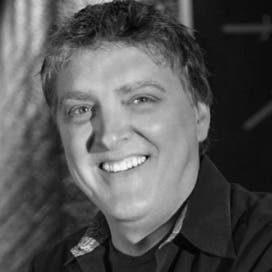
So, Owen is not only a Destiny superfan, but a Marty superfan.
"I've always followed Marty news closely and that just didn't sit well with me that he'd been fired," he says.
When Marty O'Donnell's court case with Bungie ended in a settlement, Owen sifted through the 59-page document that was placed into the public domain. In the document is a paragraph that reveals 40 minutes of the 48-minute suite is included in the Destiny game and its official soundtrack. This sparked a thought.
"I saw an entire section about Bungie using snippets of the work before and how most of it was out there and I thought, hey, I could compile this," Owen remembers.
Owen set to work, an internet detective with a Destiny obsession and a passion for music composition. His ultimate goal was to release a Definitive Edition of Music of the Spheres so fans could listen to as close an approximation of the album as possible. "Basically Bungie won't publish the work so I thought I'd try," he says.
On 24 March 2017, that work was published on YouTube alongside a Reddit post from Owen that revealed everything he and a Spanish-speaking audio editor called Tlohtzin Espinosa, or "Tlohtzin123" on Reddit, who had helped out along the way, had achieved. Marty O'Donnell was impressed - so much so that he was moved to comment: "Hey everyone. This is great to hear given how much detective work went into it. Close, but not exactly definitive. Someday I hope to be able to share the original. Owen and Tlohtzin did an amazing job."
Owen's detective work began with just one clue, a postcard posted by Marty that revealed the tracklist, running order and track time of Music of the Spheres. It was a pretty useful clue.

Cross-referencing this postcard with the titles of excerpts on the official Destiny soundtrack created a guide for what music each track on O'Donnell's postcard was supposed to feature. So, for example, track 16 from the Official Destiny Soundtrack is Excerpt from the Tribulation. The Tribulation is track four of Music of the Spheres.
And often, these excerpts in the game itself are longer than the equivalent excerpts on the official soundtrack. This gave Owen even more music to work with (Excerpt 2 from The Rose is 2:46 on the soundtrack, but five minutes on the game disc, for example). Owen had enough to get going, and so he did.
From there, Owen spent months going through the Destiny game disc files, Bungie ViDocs (promotional videos designed to hype or explain aspects of the game), trailers and "pretty much anything with a Bungie logo on it for Destiny" in a bid to uncover the right music for Music of the Spheres.
Owen started with The Path, the opening track of Music of the Spheres. Owen incorporated the track The Traveler from the Destiny Original Soundtrack with music from "Destiny Official Beta Trailer", alongside music Bungie played during its April 2015 House of Wolves livestream reveal to recreate The Path. Added together, this equated to six minutes and 20 seconds - the runtime of The Path as revealed on Marty's postcard.
But how did Owen know to use these pieces of music? Small clues. After Bungie's House of Wolves live stream, for example, Marty had tweeted to confirm that most of the music was from The Path. "That's how I figured out that melody opens The Path and Music of the Spheres," Owen says.
The Ecstasy was one of the hardest tracks to piece together, Owen says. His starting point was the ViDoc, Pathways Out of Darkness. It uses music from The Ecstasy, which Owen figured out because in the Destiny cutscene where you talk to The Speaker, Excerpt Two from The Ecstasy is played. The only problem was, Owen couldn't use certain sections of the music from Pathways Out of Darkness because Bungie employees talk over it.
Owen says Marty O'Donnell once told him, via email, that The Ecstasy opens with a short fanfare. "That was literally the only influence Marty had on our project," Owen stresses, "him telling me a fun fact. I was like, woah, is that public domain? I didn't get a response on that, as you'd expect. He didn't want to have too much of an influence on our interpretation."
Buoyed, Owen began poring through all of Destiny's cutscenes and promotional material on the hunt for something that resembled a fanfare. He came across the Tower arrival music, and it fit the bill. "It sounded a lot like something that would belong in MotS," Owen says.
"It was memorable. It was beautiful. I said this is probably that fanfare Marty was talking about. It wasn't, as I found out later."
The thing about Owen's Definitive version of Music of the Spheres is that some of it is wrong. In attempting to create tracks that matched the runtime revealed in Marty's postcard, much Destiny music was left on Owen's own cutting room floor. This, he regrets because, he suspects, some of the music he cut is actually from Music of the Spheres.
"This occurred to me after we posted the definitive version of Music of the Spheres," he says. "We don't know if a section we cut is actually part of MotS or not. If we don't know what to cut, why don't we just leave everything in? That way we don't cut the wrong thing. People have more awesome music to listen to. Is this more accurate overall? Sure, the timestamps would be wrong. It would be longer than MotS would be, but there would be more likeliness we would have the correct stuff in there.
"Probably my biggest regret with The Definitive Edition was saying, we need to fit these time stamps to give people a better idea of how long it was. Length isn't important. It's the music that's important."
The Prison was, Owen says, the hardest track to recreate. There were no excepts to guide him, no previews to pick from. Owen employed a process of elimination using a video Marty O'Donnell had uploaded to YouTube on his own channel. This video is of a talk O'Donnell delivered at the Nordic Game Conference ahead of Destiny's release (he was still working at Bungie at the time). 10 minutes before the end, O'Donnell asks for the lights to be dimmed and for audience members to close their eyes. Then he plays snippets of Music of the Spheres. One, Owen thought, was from The Prison.
"He had an excerpt from something that clearly wasn't from The Path, or The Ruin," Owen says. "It was spooky, it was different from the others. It was The Prison."
From there, Owen took a Destiny cutscene with talking that had been uploaded to YouTube, and a recording where the talking had been filtered out. He spent months trying to fuse the two together, fading out the version with talking whenever there was talking, and replacing it with the version without the talking. "When you listen to it you'll notice it fades out suddenly as people start talking in this lesser quality audio several times," Owen says.
"Sadly making the Prison what we wanted it to be was one of the sacrifices we had to make."
The Hope is the final track on Music of the Spheres. For this, Owen once again turned to O'Donnell's Nordic Game Conference talk. One of the snippets was a version of The Hope.
As the music O'Donnell plays during his Nordic fades out and the lights come up, you can hear faint guitar strums. Those are of the beginning of Hope for the Future, the Destiny-themed Paul McCartney song that so divided fans. "Oooh, what's coming next?" O'Donnell teases.
Owen noticed. "That's how we figured out Hope for the Future is the epilogue to MotS."
There's more. Owen dug through Alpha Lupi, the alternate reality game Bungie launched to hype Destiny's announcement in 2013. When you complete the ARG you receive a track called Eighth, which uses an excerpt from The Hope, which itself is on the Destiny Official Soundtrack.
"Hope is the eighth track in MotS," Owen says. "Eight has an extended choir portion. We thought, well, that's the eighth track."
The following list is the culmination of Owen's detective work, a track list for Music of the Spheres he believes amounts to the most accurate version of the unreleased album fans will ever hear:
- The Path: The Traveler (first cutscene music); Destiny Official Beta Trailer; livestream music (out of game, was used in the House of Wolves promotional live stream and later identified as being part of it).
- The Union: Excerpt from The Union (plays in the Black Garden mission); Excerpt 2 from The Union (plays on the way to the Tower in a cutscene after the first mission); Excerpt 3 from The Union (out of game, used in the Out Here in the Wild Bungie ViDoc); Video Games Live performance of The Union.
- The Ruin: Excerpt from The Ruin (plays in orbit); Reborn, from the Destiny OST; Awakening (out of game, Bungie released track from E3 2013).
- The Tribulation: Excerpt from The Tribulation (plays in Orbit); Escape Music (used when you first find your ship in the first mission); Tiger Man Music (out of game, used at GDC 2013); Relic of Hope from the Destiny OST.
- The Rose: Excerpt 1 from The Rose (plays in the cutscene during A Stranger's Call); Excerpt 2 from The Rose (extended version, used in the Garden's Spire mission).
- The Ecstasy: Arrival Fanfare (plays when you first arrive at the Tower); Excerpt from The Ecstasy (plays in Orbit); Excerpt 2 from The Ecstasy (plays during the Speaker cutscene); All Ends Are Beginnings (plays during the final cutscene).
- The Prison: Excerpt from the Prison (plays when Ghost first awakes you); Hive Temple (plays during the cutscene in which the player finds the Temple of Crota); Excerpt 2 from the Prison (plays when you meet the Queen)
- The Hope: Eighth (out of game, Bungie released track); Excerpt from The Hope (plays in orbit); Marty Nordic Hope (excerpt used by Marty at a conference); Hope for the Future by Paul McCartney (used in the game credits).
With Owen satisfied his detective work had run its course, it was time to put the Definitive Edition together. This was where Tlohtzin Espinosa, who had helped Owen with his detective work, came in. Tlohtzin took Owen's work and turned it into a high quality piece of music, handling most of the editing and the entirety of the final cut. The result is the video hosted on Tlohtzin's YouTube channel, the Definitive version of Music of the Spheres.
"We were both really passionate about MotS," Owen says. "He's a good audio editor. I'm a good transcriber and a decent audio editor. We were both really good detectives, and we were just determined. We realised that this passion was there for both of us and we knew if we could manage to work together, then the project would end up much better. We made it work. It wasn't a matter of will this work? It was going to work. It had to, for the music."
This passion even extended to the Music of the Spheres album art. If you look at Destiny's Director - a sort of solar system map - you'll see geomantic figures. These are the primary symbols used in divinatory geomancy. (Destiny itself and Music of the Spheres is thematically based upon ancient thought, which considered the world to be flat, the earth to be the center of the universe and the planets, including the moon and the sun, revolving around the earth).
In the Middle Ages, geomantic figures were assigned to the planets, but it turns out Bungie employed some creative freedom when it came to assigning the symbols to the bodies in Destiny. So of course, for the alternate album art for Music of the Spheres, Tlohtzin assigned the geomantic figures correctly, displaying an attention to detail that can be seen coursing through the project.
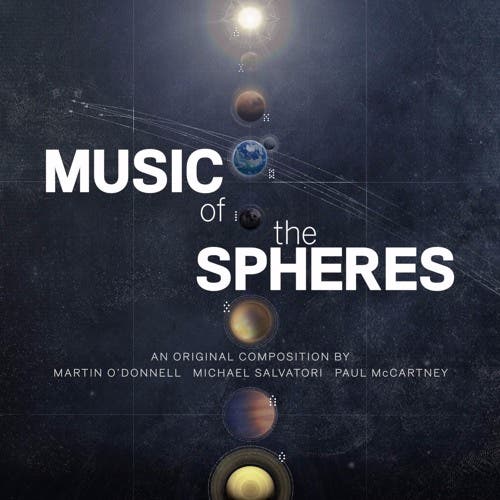
The Destiny community is well known for its devotion to the game and its relentless desire to uncover the game's secrets (players are still trying to work out if the game's first raid, Vault of Glass, has any mysteries left to solve). It's also well known for supporting those who perhaps struggle to deal with the trials and tribulations of real life. For Owen Spence, Destiny offered him both: a social circle and a project, each equally valuable.
Owen says he spent at least 430 days working on recreating Music of the Spheres. When he wasn't working on the project, he was playing Destiny. The game helps him deal with his isolation. It helps him interact with like-minded people who do not judge him, like the kids did during ninth grade. "My entire social group revolves around that one game," he says.
The detective work that went into piecing together Music of the Spheres helped, too. "As an artist with a tonne of time I needed something that challenged and inspired me and this project just always did that for me," he said. "It honestly is why I wake up in the mornings nowadays, to work on this project."
Owen was thrilled to draw praise from Marty O'Donnell, his musical hero and inspiration, for his work on Music of the Spheres. I asked the former Bungie composer for his reaction, and he told me that while Owen and his friends came close to recreating Music of the Spheres accurately, about 17 per cent of it is missing.
"I think the guys did a really nice job piecing together a suite of music from the publicly available recordings," O'Donnell told me in an email.
"There's no reason to criticise anything they've done since they had limited access and many different sources and formats, but their detective work was amazing. There are a few parts that are in the wrong places, and perhaps a few quality glitches here and there, but overall a great job."
But will Music of the Spheres ever actually come out?
"Of course I still have hope that at some point in the future Bungie and Activision will choose to release the full version of the original," O'Donnell says. "The fans deserve to hear it the way it was originally intended to be heard, including the missing 17 per cent. "I believe Sir Paul would like that too."
What does this 17 per cent involve? O'Donnell won't say, but apparently one of the tracks even included poetry based on Esoteric Christianity and "De Musica" by Boethius.
As for Owen, he says he's now done with Music of the Spheres and wants to move on to his own creations. He would love to get into music composition for video games, but admits there's a long way to go before making this particular dream a reality.
"I'm just making it up as I go," he says. "First I got to get back to highschool, then I got to get my diploma there."








